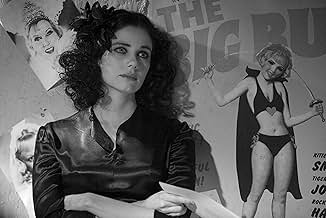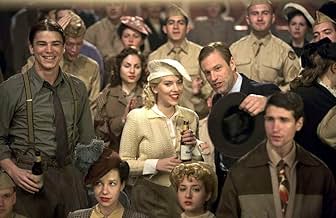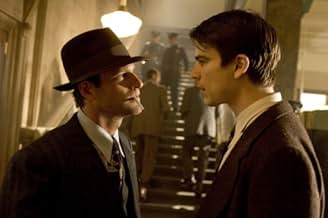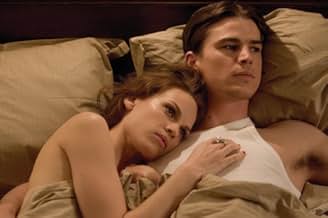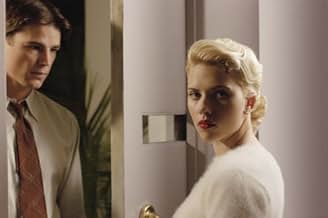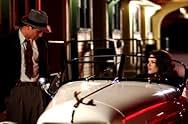NOTE IMDb
5,6/10
79 k
MA NOTE
Deux policiers voient leurs vies personnelles et professionnelles s'effondrer à la suite de l'enquête sur le meurtre du "Dahlia noir".Deux policiers voient leurs vies personnelles et professionnelles s'effondrer à la suite de l'enquête sur le meurtre du "Dahlia noir".Deux policiers voient leurs vies personnelles et professionnelles s'effondrer à la suite de l'enquête sur le meurtre du "Dahlia noir".
- Réalisation
- Scénario
- Casting principal
- Nommé pour 1 Oscar
- 4 victoires et 16 nominations au total
Angus MacInnes
- Capt. John Tierney
- (as Angus MacInnis)
Avis à la une
Now I like Brian DePalma, and I love Carrie, The Untouchables and Carlito's Way. Out of the films of his I've seen, The Black Dahlia is my least favourite in my view, though I was also rather disappointed in Scarface too.
I was really interested in its concept and the story seemed interesting. Also the film is very well made, with stylish cinematography and beautiful scenery, costumes, sets and makeup, DePalma's direction has occasional flashes of brilliance and the music was quite nice as well.
However, this is another case of style over substance. The script falls flat, with little idea of which direction to go, and the tone of the story is also uneven with some scenes disappointingly over-the top. The characters I felt indifferent to, and I also thought they were quite shallow and poorly explored, the pace is rather meandering and with exception of Fiona Shaw who's quite good the acting is bland. Also the ending I think is overdone.
All in all, interesting initially and while well made it is emotionally hollow and flat in its scripting and characterisation. 4/10 Bethany Cox
I was really interested in its concept and the story seemed interesting. Also the film is very well made, with stylish cinematography and beautiful scenery, costumes, sets and makeup, DePalma's direction has occasional flashes of brilliance and the music was quite nice as well.
However, this is another case of style over substance. The script falls flat, with little idea of which direction to go, and the tone of the story is also uneven with some scenes disappointingly over-the top. The characters I felt indifferent to, and I also thought they were quite shallow and poorly explored, the pace is rather meandering and with exception of Fiona Shaw who's quite good the acting is bland. Also the ending I think is overdone.
All in all, interesting initially and while well made it is emotionally hollow and flat in its scripting and characterisation. 4/10 Bethany Cox
Dante Ferretti's set design beautifully evokes the 1940's; Vilmos Zsigmond's cinematography enhances the period look; and the voice-over narration has been pulled from film-noir classics. While Brian De Palma's "The Black Dahlia" has much of the look and feel of Curtis Hanson's 1997 "L.A. Confidential," that far superior film boasted better performances and a well-written screenplay. Although both films were based on James Ellroy novels and both had complicated, involved plots, the Hanson film came together with satisfying logic. Unfortunately, De Palma's movie is equally if not more complex and leaves a few threads dangling or at least badly frayed.
Although loosely based on a famous Hollywood murder, "The Black Dahlia" spends more time than necessary in establishing the three-way partnership, if not ménage, between Josh Hartnett, Scarlett Johansson, and Aaron Eckhart. The leisurely pace allows viewers to ponder the last time that they saw a film with so many double letters in the stars' names. The trailer, which has played in theaters for weeks, was misleading, and the actual murder and resulting investigation do not begin until well into the film after we have witnessed boxing scenes between the police investigators, Hartnett and Eckhart, and some three-way flirtations that do little to advance the proceedings.
The film only becomes interesting when the campy upper crust Linscott family enters. Hilary Swank as Madeleine Linscott is a deadly femme in black and as fatale as they come. Fiona Shaw as her mother shamelessly steals scenes and chews the banisters in her few minutes on screen, and John Kavanagh as Emmet Linscott adds to the family's quirky personality. An entire film could have been constructed around the Linscotts that would have been far more interesting than the Hartnett-Johansson-Eckhart romance. Scarlett has little to do but purse her luscious red lips and look desirable in tight blouses, which she does quite well. Josh is all squinty-eyed intensity and muscled charm, which he does quite well. Aaron tries for more, but goes a bit over the top; perhaps he would have been more comfortable playing a cousin of the Linscotts.
Although "The Black Dahlia" is not the worst way to spend two hours, the film's pedigree would lead viewers to expect more. Only a week after the less-disappointing "Hollywoodland," De Palma's take on another old Hollywood mystery should have been riveting. All of the essentials were there, except possibly a seasoned troop of stars, for another "L.A. Confidential." Unfortunately, what arrived was a nearly indecipherable mystery within a tedious love triangle that was wrapped in multi-million dollar production values.
Although loosely based on a famous Hollywood murder, "The Black Dahlia" spends more time than necessary in establishing the three-way partnership, if not ménage, between Josh Hartnett, Scarlett Johansson, and Aaron Eckhart. The leisurely pace allows viewers to ponder the last time that they saw a film with so many double letters in the stars' names. The trailer, which has played in theaters for weeks, was misleading, and the actual murder and resulting investigation do not begin until well into the film after we have witnessed boxing scenes between the police investigators, Hartnett and Eckhart, and some three-way flirtations that do little to advance the proceedings.
The film only becomes interesting when the campy upper crust Linscott family enters. Hilary Swank as Madeleine Linscott is a deadly femme in black and as fatale as they come. Fiona Shaw as her mother shamelessly steals scenes and chews the banisters in her few minutes on screen, and John Kavanagh as Emmet Linscott adds to the family's quirky personality. An entire film could have been constructed around the Linscotts that would have been far more interesting than the Hartnett-Johansson-Eckhart romance. Scarlett has little to do but purse her luscious red lips and look desirable in tight blouses, which she does quite well. Josh is all squinty-eyed intensity and muscled charm, which he does quite well. Aaron tries for more, but goes a bit over the top; perhaps he would have been more comfortable playing a cousin of the Linscotts.
Although "The Black Dahlia" is not the worst way to spend two hours, the film's pedigree would lead viewers to expect more. Only a week after the less-disappointing "Hollywoodland," De Palma's take on another old Hollywood mystery should have been riveting. All of the essentials were there, except possibly a seasoned troop of stars, for another "L.A. Confidential." Unfortunately, what arrived was a nearly indecipherable mystery within a tedious love triangle that was wrapped in multi-million dollar production values.
Fictional movie based on a real unsolved Hollywood murder in the 1940s. The mutilated body of Elizabeth Short (Mia Kirschner) is found in an empty lot. Officer Dwight Bleichert (Josh Harnett) and Sgt. Leland Blanchard (Aaron Eckhart) are assigned to the case. Blanchard becomes obsessed with the case causing troubles with his girlfriend Kay Lake (Scarlett Johansson). She then falls for Bleichert. Then there are more murders and lesbians and incest are thrown in...
The plot is a little too convoluted but so was the book (by Jack Ellroy). To be totally honest I can't understand why this is getting blasted by the critics. It's no masterpiece but it's 100 times better than director Brian DePalma's last film (2002's terrible "Femme Fatale") and probably his best work since 1996's "Mission Impossible". The 1940s setting is beautifully captured with clothes and settings--this film really looks great. DePalma once again gives us some incredible visual sequences--one murder is downright terrifying and one of the best things he's done in years. Also the plot, while involved, does reach a logical, satisfying conclusion. However the film isn't perfect.
There's a lesbian bar here that's really overdone. It's beautiful, with a ridiculously elaborate stage show--but in 1940s Hollywood? I don't think so. The acting is all over the place. Eckhart OVERACTS to a ridiculous degree. Hartnett is terrible (no surprise there) but so are Johansson and Hilary Swank (both wonderful actresses). It seems like Harnett's presence bring them down to his level of non acting. Last, and least, is English actress Fiona Lewis who is certainly acting but not in this picture. She overdoes it so much she makes Eckhart look restrained.
So I DID like it but with a tighter story and a better leading man this might have been great. As it stands it's a very good, well-made movie with some questionable acting. I give it a 7.
The plot is a little too convoluted but so was the book (by Jack Ellroy). To be totally honest I can't understand why this is getting blasted by the critics. It's no masterpiece but it's 100 times better than director Brian DePalma's last film (2002's terrible "Femme Fatale") and probably his best work since 1996's "Mission Impossible". The 1940s setting is beautifully captured with clothes and settings--this film really looks great. DePalma once again gives us some incredible visual sequences--one murder is downright terrifying and one of the best things he's done in years. Also the plot, while involved, does reach a logical, satisfying conclusion. However the film isn't perfect.
There's a lesbian bar here that's really overdone. It's beautiful, with a ridiculously elaborate stage show--but in 1940s Hollywood? I don't think so. The acting is all over the place. Eckhart OVERACTS to a ridiculous degree. Hartnett is terrible (no surprise there) but so are Johansson and Hilary Swank (both wonderful actresses). It seems like Harnett's presence bring them down to his level of non acting. Last, and least, is English actress Fiona Lewis who is certainly acting but not in this picture. She overdoes it so much she makes Eckhart look restrained.
So I DID like it but with a tighter story and a better leading man this might have been great. As it stands it's a very good, well-made movie with some questionable acting. I give it a 7.
It has been almost ten years since Curtis Hanson delivered what was arguably the best picture of 1997, L.A. Confidential. That movie was great in almost every way (my key dislike was only in the performance of Kim Basinger, yet the Academy did not agree with me), and a big part of that was due to the source material from James Ellroy. And now comes The Black Dahlia, another one of Ellroy's books based on detectives in the 1940's, only revolving around a real event and having master filmmaker Brian De Palma at the helm. And unfortunately, the film comes with mixed results.
After taking part in a boxing match which ends up giving a whole lot more power to the L.A.P.D., Dwight "Bucky" Bleichert (Josh Hartnett) and Leland "Lee" Blanchard (Aaron Eckhart) are promoted to detectives and become partners. Shortly afterwards, they become entangled in the brutal murder of Elizabeth Short (Mia Kirshner), otherwise known as the titular Black Dahlia. What follows for them is a tale of corruption, greed and vengeance. It may not seem like much (not too mention the femme fatales of Scarlett Johansson and Hilary Swank), but the film really has a lot going on.
And this is where a bit of the problems lie.
Some of the events that occur over the course of the film, are just completely random and almost unexplainable. Hell, random subplots appear and disappear faster than they come up. When it really starts getting down to business, the movie becomes downright confusing, and the narrative does not let up for anyone to truly figure it all out. It gets especially bizarre in the final act, when almost nothing truly makes sense, and we just have to sit and just contend with what ends up happening. It makes it seem like they want the audience to sift through and determine what is relevant to the film and what is not, and only then can they truly grasp onto a full understanding. Even after watching the film a few hours ago, I still question some of the things that happened.
I think one of the key reasons it does not make a whole whack of sense is the fact that it revolves around a real event. Last week's Hollywoodland had this same problem in that the filmmakers do not seem to have an idea of where to draw your attention. Do they want the focus on the murder itself, or do they want the focus on the cops investigating it? Adding in a few seemingly bizarre backstories does not help this either. They seem to strike gold when they focalize on what the murder and its impending investigation is doing to Bucky and Lee, but they do not spend enough time expressing it. They touch on it in passing, and instead, cut to either useless items, or completely random things. You can tell that there is some form of direction however, just not enough.
Hartnett plays Bucky very smoothly, and does a very adequate job in his narration. He really lacks the zest to make his character interesting however, and has a really tough time trying to make the audience care about him. He just does not seem to have the hard-boiled cop schtick nailed down here, and only comes off as a little less than soft-boiled. Eckhart on the other hand, does have the zest and really shines through as Lee. His character goes through most of the changing during the film, and you can see the dramatic change of character as the film progresses. He just does not have nearly enough screen time to truly flesh him from being the strange and mysterious character.
Johansson does well for herself as the girl stuck between the two partners, and only sparingly gets the opportunity to stretch out her enigmatic character. Swank on the other hand, feels completely useless in the scheme of things (until her character actually serves a purpose later in the film). Her disappear/reappearing Scottish accent is laughable, and her whole performance really begs the question of how she has managed to snag two Best Actress Oscars in less than ten years. Supporting work, especially from Mike Starr, Fiona Shaw and the flashback heavy Kirshner, are all on the mark and are fairly well done in their limited roles.
Whereas there were problems with many other things, there are none with the sets, costumes and cinematography. This is 1940's Los Angeles, and it looks gorgeous. Every single minute detail seems to have been polished and amped up to the point of looking like it was filmed sixty years ago. It makes the film feel more realistic than it is, and makes the sheer "coolness" of the settings and characters stand right out. Although it may be advertised as being noir, it really is nowhere near as dark as it could have been. Yet, it still has enough packed into it to make this film visually astonishing.
Another standout is the feel of it being a De Palma film. The camera angles, the slow motion, the violence, the sheer editing of it all (especially the worn black and white film clips of Kirshner as Short), just screams old school De Palma. From the start, even with its problems, the audience knows it is in the hands of a style master, and in that regard, the film is consistent and on the mark.
But unfortunately, that same phrase cannot be used to describe the rest of the film. It is truly a mixed bag, but despite its confusing narrative, it is still interesting and stylish as hell. But I still cannot help but be disappointed overall. I guess I was just expecting a whole lot more.
7/10.
After taking part in a boxing match which ends up giving a whole lot more power to the L.A.P.D., Dwight "Bucky" Bleichert (Josh Hartnett) and Leland "Lee" Blanchard (Aaron Eckhart) are promoted to detectives and become partners. Shortly afterwards, they become entangled in the brutal murder of Elizabeth Short (Mia Kirshner), otherwise known as the titular Black Dahlia. What follows for them is a tale of corruption, greed and vengeance. It may not seem like much (not too mention the femme fatales of Scarlett Johansson and Hilary Swank), but the film really has a lot going on.
And this is where a bit of the problems lie.
Some of the events that occur over the course of the film, are just completely random and almost unexplainable. Hell, random subplots appear and disappear faster than they come up. When it really starts getting down to business, the movie becomes downright confusing, and the narrative does not let up for anyone to truly figure it all out. It gets especially bizarre in the final act, when almost nothing truly makes sense, and we just have to sit and just contend with what ends up happening. It makes it seem like they want the audience to sift through and determine what is relevant to the film and what is not, and only then can they truly grasp onto a full understanding. Even after watching the film a few hours ago, I still question some of the things that happened.
I think one of the key reasons it does not make a whole whack of sense is the fact that it revolves around a real event. Last week's Hollywoodland had this same problem in that the filmmakers do not seem to have an idea of where to draw your attention. Do they want the focus on the murder itself, or do they want the focus on the cops investigating it? Adding in a few seemingly bizarre backstories does not help this either. They seem to strike gold when they focalize on what the murder and its impending investigation is doing to Bucky and Lee, but they do not spend enough time expressing it. They touch on it in passing, and instead, cut to either useless items, or completely random things. You can tell that there is some form of direction however, just not enough.
Hartnett plays Bucky very smoothly, and does a very adequate job in his narration. He really lacks the zest to make his character interesting however, and has a really tough time trying to make the audience care about him. He just does not seem to have the hard-boiled cop schtick nailed down here, and only comes off as a little less than soft-boiled. Eckhart on the other hand, does have the zest and really shines through as Lee. His character goes through most of the changing during the film, and you can see the dramatic change of character as the film progresses. He just does not have nearly enough screen time to truly flesh him from being the strange and mysterious character.
Johansson does well for herself as the girl stuck between the two partners, and only sparingly gets the opportunity to stretch out her enigmatic character. Swank on the other hand, feels completely useless in the scheme of things (until her character actually serves a purpose later in the film). Her disappear/reappearing Scottish accent is laughable, and her whole performance really begs the question of how she has managed to snag two Best Actress Oscars in less than ten years. Supporting work, especially from Mike Starr, Fiona Shaw and the flashback heavy Kirshner, are all on the mark and are fairly well done in their limited roles.
Whereas there were problems with many other things, there are none with the sets, costumes and cinematography. This is 1940's Los Angeles, and it looks gorgeous. Every single minute detail seems to have been polished and amped up to the point of looking like it was filmed sixty years ago. It makes the film feel more realistic than it is, and makes the sheer "coolness" of the settings and characters stand right out. Although it may be advertised as being noir, it really is nowhere near as dark as it could have been. Yet, it still has enough packed into it to make this film visually astonishing.
Another standout is the feel of it being a De Palma film. The camera angles, the slow motion, the violence, the sheer editing of it all (especially the worn black and white film clips of Kirshner as Short), just screams old school De Palma. From the start, even with its problems, the audience knows it is in the hands of a style master, and in that regard, the film is consistent and on the mark.
But unfortunately, that same phrase cannot be used to describe the rest of the film. It is truly a mixed bag, but despite its confusing narrative, it is still interesting and stylish as hell. But I still cannot help but be disappointed overall. I guess I was just expecting a whole lot more.
7/10.
Anybody expecting to get a great account of the Black Dahlia case, even fictional, will be disappointed going in to this movie. Of course, I knew that it was a fictionalization of the case, but I had no idea the movie would present its own evidence and draw its own conclusions.
But the main problem here is not the lack of factual detail, so much as the confusion of plot that surrounds and overwhelms the Black Dahlia case itself. So much plot and character and sideplots and backstory are built around the central characters that the case itself seems like a distraction. A key plot point and character motivator is the fascination of the two detectives with the murder, but this is never elaborated enough in the film, and we're left to half-heartedly guess at the character motivations.
The tone is never consistently campy, but when the camp arrives it overwhelms the story. A dinner scene between a suspect and her family had the crowd in stitches (the only scene during which the audience laughed). The problem is that the scene is valuable to the plot and should never have been played for laughs. Hitchcock or even Lynch could have shot the same scene, with the same events and dialogue, and made it menacing and creepy, which it needed to be to function in the mystery.
Other problems: De Palma uses the lesbian angle of the movie (never a part of the case) to full exploitative advantage, and the actresses seem unable to master to the expressive 1940s style acting that would have come naturally to even a marginal 40s star.
Although the film brings a clearcut finale rather than a vague puzzle, too many loose threads come together too neatly and rather than bringing the film to a satisfactory conclusion, it leaves you scratching your head, is this what I spent the last 2 hours waiting to hear? Overall, there is too much plot, too little character development and a wildly uneven tone. The movie has its moments but it's a blinding mess all together.
But the main problem here is not the lack of factual detail, so much as the confusion of plot that surrounds and overwhelms the Black Dahlia case itself. So much plot and character and sideplots and backstory are built around the central characters that the case itself seems like a distraction. A key plot point and character motivator is the fascination of the two detectives with the murder, but this is never elaborated enough in the film, and we're left to half-heartedly guess at the character motivations.
The tone is never consistently campy, but when the camp arrives it overwhelms the story. A dinner scene between a suspect and her family had the crowd in stitches (the only scene during which the audience laughed). The problem is that the scene is valuable to the plot and should never have been played for laughs. Hitchcock or even Lynch could have shot the same scene, with the same events and dialogue, and made it menacing and creepy, which it needed to be to function in the mystery.
Other problems: De Palma uses the lesbian angle of the movie (never a part of the case) to full exploitative advantage, and the actresses seem unable to master to the expressive 1940s style acting that would have come naturally to even a marginal 40s star.
Although the film brings a clearcut finale rather than a vague puzzle, too many loose threads come together too neatly and rather than bringing the film to a satisfactory conclusion, it leaves you scratching your head, is this what I spent the last 2 hours waiting to hear? Overall, there is too much plot, too little character development and a wildly uneven tone. The movie has its moments but it's a blinding mess all together.
Le saviez-vous
- AnecdotesWhen Dwight "Bucky" Bleichert goes searching through some photographs, you can see a real autopsy photo of Elizabeth Short.
- GaffesCharacters who knew Elizabeth Short refer to her as 'Betty' constantly. Though Elizabeth Short was known during her childhood as Betty in her hometown, she used the name 'Beth' not Betty throughout her stay in Los Angeles.
- Citations
Emmet Linscott: What kind of name is Bleichert? Dutch?
Ofcr. Dwight "Bucky" Bleichert: German.
Emmet Linscott: Ah, a great people, the Germans. Hitler was a bit excessive. But mark my words that someday we'll regret not joining forces with him to fight the Reds.
- Bandes originalesIn the Mood
Written by Joe Garland (as Joseph C. Garland)
Used by Permission of Shapiro Bernstein & Co. Inc. (ASCAP)
Meilleurs choix
Connectez-vous pour évaluer et suivre la liste de favoris afin de recevoir des recommandations personnalisées
Détails
- Date de sortie
- Pays d’origine
- Langues
- Aussi connu sous le nom de
- La Dalia Negra
- Lieux de tournage
- Sociétés de production
- Voir plus de crédits d'entreprise sur IMDbPro
Box-office
- Budget
- 50 000 000 $US (estimé)
- Montant brut aux États-Unis et au Canada
- 22 545 080 $US
- Week-end de sortie aux États-Unis et au Canada
- 10 005 895 $US
- 17 sept. 2006
- Montant brut mondial
- 49 332 692 $US
- Durée2 heures 1 minute
- Couleur
- Mixage
- Rapport de forme
- 2.35 : 1
Contribuer à cette page
Suggérer une modification ou ajouter du contenu manquant

Lacune principale
By what name was Le dahlia noir (2006) officially released in India in Hindi?
Répondre






